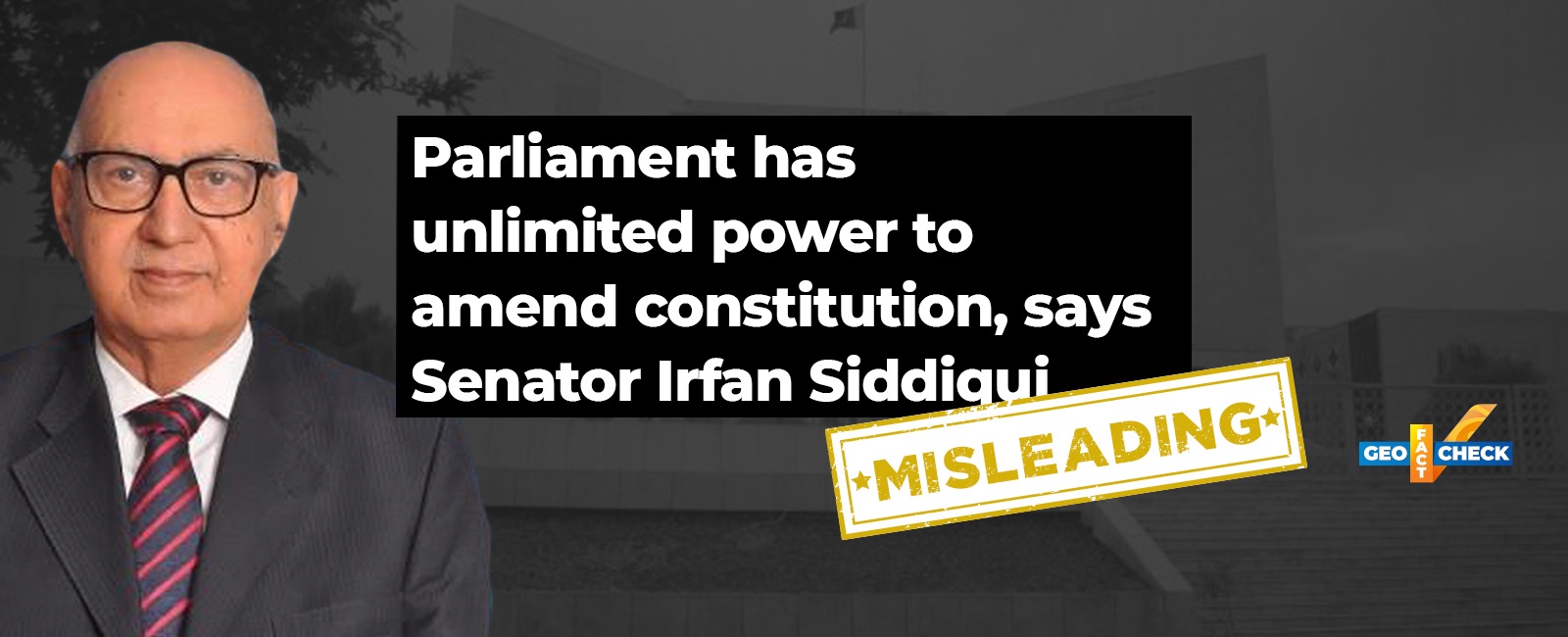Fact-check: Senator Irfan Siddiqui misleads on parliament's unlimited power to amend Constitution
In 2015, SC judgement already ruled that if constitutional amendments try to change essential features of Constitution, they can be challenged in court

Senator Irfan Siddiqui, belonging to the ruling Pakistan Muslim League-Nawaz (PML-N), has claimed that as per Pakistan’s Constitution there are no limits whatsoever on the parliament's power to amend the constitution and that these amendments cannot be looked into by courts.
The claim is misleading.
Claim
On September 25, during a press briefing, Senator Siddiqui read out Article 239(5) of the Constitution, stating that no constitutional amendment can be called into question in any court on any ground whatsoever.
“Yet, our amendments are challenged in court, such as the 18th Amendment,” he said, adding that now Article 239(5) has become null.
Siddiqui continued that clause 6 of the same Article states that there is no limitation whatsoever on the power of the parliament to amend any of the provisions of the constitution.
The senator’s remarks can be viewed at the 8:00 timestamp here.
Fact
Two lawyers, a former Supreme Court judge, and a 2015 verdict of the Supreme Court confirm that there are certain restrictions on the powers of the parliament to amend the constitution, which can be taken to court.
Islamabad-based lawyer Salaar Khan told Geo Fact Check over the phone that the Supreme Court had already decided this question in the 2015 verdict in District Bar Association (Rawalpindi) v. Federation of Pakistan (PLD 2015 SC 401) case, in which the constitutional validity of the 18th and 21st constitutional amendments was challenged.
“The preliminary question [before the Court] was whether amendments to the Constitution could be challenged despite the bar under Article 239,” he explained.
“The majority opinion of the Supreme Court's bench held that the Constitution has certain salient features, and if [an amendment] violates these features, then the court can strike down an amendment.”
In this case, Khan added that while the court did not strike down the above-mentioned amendments, it recognised that it has the prerogative to annul amendments passed by a two-thirds majority of parliament if they are against the salient features of the constitution.
“I definitely believe that the statement made by the senator is misleading,” the lawyer said, “As there is already a final judgement on this matter by the Supreme Court, and that judgment is an interpretation of the Constitution.”
Salahuddin Ahmed, a Karachi-based lawyer, agreed with Khan. He also referred to the same 2015 verdict of the Supreme Court.
“The Supreme Court has held that constitutional amendments can be challenged if they exceed the merely ‘amendatory power’ and try to change the basic structure or essential features of the Constitution such as federalism, parliamentary democracy, or the independence of the judiciary,” Ahmed told Geo Fact Check via messages.
Faisal Arab, a former Supreme Court judge, also disagreed with the senator.
“There are some basic structures of the Constitution, and if an amendment disturbs the basic structure of the Constitution, the court can strike down [that constitutional amendment],” Arab explained.
The judge added that if tomorrow, [for example] the parliament passes an amendment stating that general elections would be conducted every 10 years or that parliament members would be elected for life, such amendments would disturb the basic structure of the Constitution, and the courts would have to intervene.
In the District Bar Association (Rawalpindi) v. Federation of Pakistan (PLD 2015 SC 401), a significant majority — 13 out of the 17 justices of the Supreme Court — ruled that the court can strike down a constitutional amendment if it repeals, alters, or abrogates the "salient features" of the constitution. The judgment can be read here.
Follow us on @GeoFactCheck on X (Twitter) and @geo_factcheck on Instagram. If our readers detect any errors, we encourage them to contact us at [email protected]





